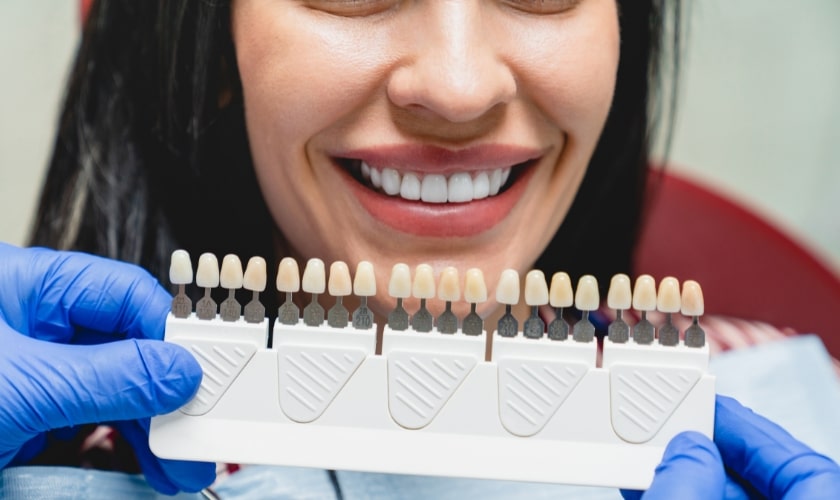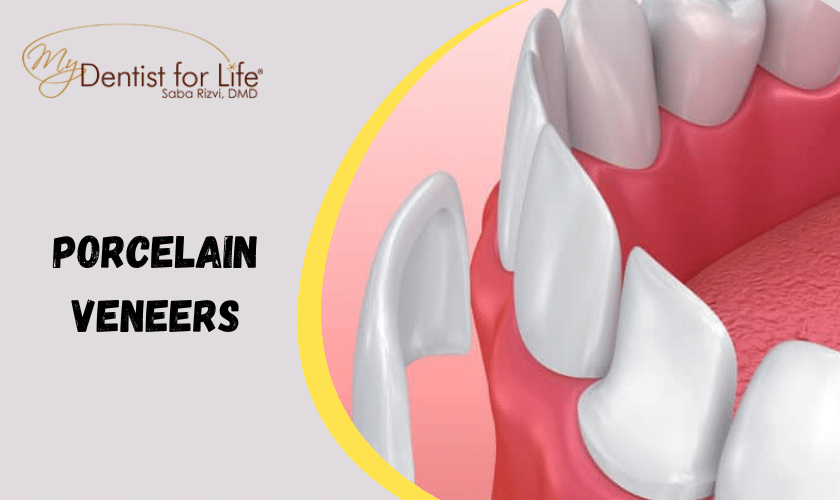ONLINE SCHEDULING AND VIRTUAL CONSULTS AVAILABLE

Veneers 101: Everything You Need to Know About Transforming Your Smile

Veneers have revolutionized the field of dentistry. They offer patients a minimally invasive yet highly effective way to achieve a radiant smile. The front surface of teeth is covered with thin shells made of porcelain or composite materials. Dental Veneers can mask stains, close gaps, and even out irregularities, providing a natural-looking appearance. With their ability to address a wide range of cosmetic concerns, veneers have become increasingly popular among individuals seeking to enhance their smiles and regain confidence in their appearance.
In the realm of cosmetic dentistry, veneers in Plantation stand as versatile marvels capable of transforming smiles and boosting confidence. Whether you’re looking to conceal imperfections, correct misalignments, or enhance the overall aesthetics of your teeth, veneers offer a customizable solution tailored to your unique dental needs.
In this blog, we’ll delve into everything you need to know about veneers in Plantation. From the types available to the candidacy criteria, the process involved, and the maintenance required post-procedure. If you’re considering veneers, with the right knowledge you will be able to make informed decisions.
Types of Veneers
Porcelain Veneers
- Porcelain veneers come from high-quality ceramic material, customized to match the color, shape, and translucency of natural teeth.
- Their durability, resistance to stains, and ability to mimic the light-reflecting properties of natural enamel make them popular.
- Porcelain veneers are a popular choice for individuals seeking long-lasting smile enhancements with a lifelike appearance.
Composite Veneers
- Composite veneers are made of a tooth-colored composite resin material. A dentist directly applies and shapes them onto the teeth.
- These veneers offer a more affordable alternative to porcelain veneers and can be completed in a single dental visit.
- While composite veneers may not be as stain-resistant or long-lasting as porcelain veneers, they can still effectively improve the appearance of teeth with minor imperfections.
Differences Between the Two Types
- Porcelain veneers tend to be more durable and stain-resistant compared to composite veneers.
- Composite veneers are typically more affordable and require less tooth preparation compared to porcelain veneers, but may not last as long.
- The choice between porcelain and composite veneers depends on factors such as budget, aesthetic preferences, and the extent of dental corrections needed.
Candidacy for Veneers
Common Dental Issues Addressed by Veneers
- Veneers can effectively conceal various dental imperfections such as chipped, cracked, or worn teeth.
- They are also used to mask discoloration, including stains that do not respond well to traditional whitening treatments.
- Veneers in Plantation can improve the appearance of misaligned or unevenly spaced teeth, creating a more uniform and symmetrical smile.
Factors to Consider When Determining Candidacy:
- Good oral health: Candidates for veneers should have healthy teeth and gums, free from decay or gum disease.
- Sufficient tooth enamel: Adequate enamel is necessary to support the veneers and ensure a durable bond with the teeth.
- Realistic expectations: Patients should have realistic expectations about the outcomes of veneer treatment and understand its limitations.
- Commitment to oral hygiene: Proper oral hygiene practices, including regular brushing, flossing, and dental visits, are essential for maintaining veneers and preventing complications.
The Veneer Process
Initial Consultation and Treatment Planning:
- During the consultation, the cosmetic dentist discusses the patient’s goals and expectations for the veneer treatment.
- A comprehensive examination of the teeth and oral health is conducted to determine suitability for veneers.
- The treatment plan is customized based on the patient’s unique needs and desired outcomes.
Preparation of Teeth and Impression-Taking:
- A small amount of enamel is removed from the front surface of the teeth to accommodate the thickness of the veneers.
- Impressions or digital scans of the prepared teeth are taken to create custom-made veneers.
- Temporary veneers may be placed to protect the teeth while the permanent ones are being fabricated.
Fabrication and Placement of Veneers:
- The impressions or digital scans are sent to a dental laboratory where skilled technicians fabricate the veneers.
- Once the veneers are ready, they are checked for fit, color, and aesthetics before being permanently bonded to the teeth.
- The dentist carefully bonds each veneer to its corresponding tooth using a special adhesive and ensures proper alignment and bite.
The veneer process typically involves multiple appointments spread over several weeks to ensure precise planning, fabrication, and placement of the veneers for optimal results.
The Pros of Veneers
- Smile Enhancement: Veneers offer a versatile solution for improving the appearance of teeth, addressing various cosmetic concerns such as discoloration, chipping, gaps, and misalignment.
- Natural Appearance: Porcelain veneers mimic the translucency and texture of natural tooth enamel, providing a seamless and lifelike appearance.
- Stain Resistance: Porcelain veneers are highly resistant to staining from food, beverages, and tobacco, ensuring long-lasting aesthetic results.
- Minimal Tooth Alteration: Compared to other dental restorations, veneers require minimal removal of tooth enamel, preserving the natural tooth structure.
- Customization: Veneers are custom-made to match the shape, size, and color of the patient’s natural teeth, allowing for personalized and natural-looking results.
- Durability: Properly maintained veneers can last for a decade or more, providing a durable and reliable solution for enhancing the smile.
- Immediate Results: Veneers in Plantation offers an efficient cosmetic solution with relatively quick results, allowing patients to achieve their desired smile transformation in a timely manner.
Maintaining Veneers
- Oral Hygiene Practices: Regular brushing and flossing are essential for maintaining the cleanliness of veneers and preventing plaque buildup and gum disease. Using a non-abrasive toothpaste and a soft-bristled toothbrush can help preserve the integrity of the veneers.
- Routine Dental Visits: Schedule regular dental check-ups and professional cleanings to monitor the condition of your veneers and address any issues early on. Your dentist can assess the integrity of the veneers and recommend any necessary maintenance or repairs.
- Avoiding Hard Foods: Refrain from biting or chewing on hard objects such as ice, pens, or fingernails, as this can increase the risk of chipping or fracturing the veneers.
- Limiting Staining Substances: Minimize consumption of foods and beverages that can stain the veneers, such as coffee, tea, red wine, and berries. If you do consume staining substances, rinse your mouth with water afterward and maintain good oral hygiene habits.
- Mouthguards for Sports: If you participate in contact sports or activities that pose a risk of dental trauma, consider wearing a mouthguard to protect your veneers and natural teeth from injury.
Choosing a Veneer Provider:
Experience and Expertise: Look for a dentist who specializes in cosmetic dentistry and has extensive experience in performing veneer procedures. Check their credentials, training, and years of practice to ensure they have the necessary expertise.
Portfolio of Work: Review before-and-after photos of previous veneer cases performed by the dentist. It will help you assess the quality of their work and determine if their aesthetic style aligns with your preferences.
Patient Reviews and Testimonials: Read online reviews and testimonials from previous patients to gauge their satisfaction with the dentist’s services.
Technology and Techniques: Inquire about the technology and techniques used by the dentist for veneer procedures. A provider who stays updated on the latest advancements in cosmetic dentistry may offer more innovative and effective treatment options.
Communication and Comfort: Choose a dentist who prioritizes clear communication, listens to your concerns, and addresses any questions or apprehensions you may have about the veneer process. Feeling comfortable and confident in your provider’s abilities is crucial for a positive treatment experience.
Veneers offer a transformative solution for enhancing your smile and boosting confidence. From understanding the types and candidacy to the meticulous process and maintenance tips, this guide equips you with all you need to know. Trust a skilled provider to achieve your dream smile with veneers in Plantation.




